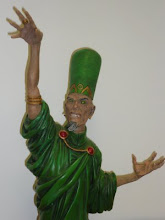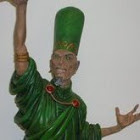
This is the amazing story of the "Spice Race" and the extraordinary and unexpected consequences arising from it. Spices had an enormous importance in the 15th & 16th centuries, both for food preparation and preservation and more importantly in medicine. Nutmeg in particular was considered an essential part of the cure of bubonic plague, and was wildly expensive and exceptionally scarce. One doctor noted "I confess they are costly, but cheape medicines are as dear as death". The source of nutmeg was a mystery in Europe until 1511, prior to that Venetian merchants bought the spice Turkey from merchants there with no idea where it originated from. It only grew in a small cluster of islands near Indonesia, due to singular climatic and geological features. It was a Portuguese ship that was the first European vessel to land on one of the islands and from there the spice race developed a huge, violent and extraordinary momentum.
Portugal at first, followed swiftly by the Dutch and English who quickly squeezed out the Portuguese, set out building up a trade route to the islands to harvest their near unimaginable riches. Ten pounds of nutmeg cost one penny in the East Indies and sold for fifty shillings (600 pence) in London. With ships transporting tons of spice the return was so great that the absurd level of risk associated with the trade was worth it to the merchants involved.
For any ship setting sail from Amsterdam or London to the Spice Islands it was far more likely that they would sink, loose most of their crew to illness before they arrived, then lose yet more to disease when they arrived, be involved in violent confrontations with other European traders before having to manage to repeat all the trouble of the outbound voyage on the way home. This book tells the extraordinary stories of the people who threw themselves into the unknown motivated by greed or excitement at seeking out the unknown. Their travels and trials are extraordinary, and described with clarity and skill. All the usual vices of colonial enterprise are listed, slavery, casual massacre, treachery, destruction, there are also notable instances of physical and moral courage, friendship and spirited adventure.
The final resolution of the spice race was completely unexpected for me, the consequences justify the sub title of the book. This is a first rate popular history telling a little known story with verve and skill, mixing the wider context with telling details in just the right measure.


No comments:
Post a Comment